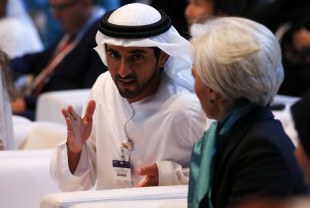

Dubai strives to become capital of Islamic economy

Dubai on Tuesday launched an updated strategy for 2017-2021 to establish the emirate as the capital of the Islamic economy.
The Dubai Islamic Economy Development Centre (DIEDC) said the refreshed strategy focuses on ensuring long-term impact, with its main objective to lead the growth of the Islamic economy sectors on a local, regional and international scale, and to set a benchmark for the Islamic ecosystem worldwide.
At the heart of the strategy are three key pillars – Islamic finance, Halal sector, and Islamic lifestyle that includes culture, art, fashion and family tourism, a statement said.
Knowledge, standards and digital Islamic economy serve as cornerstones in supporting the pillars while playing a pivotal role in shaping an enabling environment for sustainable investments and real development, it added.
Sheikh Hamdan bin Mohammed bin Rashid Al Maktoum, Crown Prince of Dubai, chairman of Dubai Executive Council and general supervisor of the Dubai Capital of Islamic Economy initiative, said: “The new strategy uses a two-pronged approach. The first part concentrates on the development of the Islamic economy system and includes identifying new key performance indicators for monitoring the growth of important sectors and measuring their contribution to the national economy.
"The second component includes enhancing Dubai’s status as a global reference for Islamic finance, industry, trading standards and culture, and as a prime destination for Halal trade and family tourism.”
Sheikh Hamdan added: “Contrary to what some may think, Islamic economy does not belong to the past – rather, it is firmly rooted in the present and the future. Achieving progress is meaningless without sustainability, financial security and economic stability. Most young people today, especially in the UAE, no longer revel in material excesses. Instead, they enjoy applying creativity and innovation in producing real tools for development.
"It is crucial to empower young talent with the latest advancements in knowledge and technology as well as with the ethical foundations that Islamic economy incorporates. The success of our efforts will depend on our creativity in developing the ethical framework of the Islamic ecosystem.”
Sultan bin Saeed Al Mansouri, UAE Minister of Economy and chairman of DIEDC, said that with its ability to diversify national incomes and contribute to building a post-oil economy, the Islamic economy system has attracted the attention of several prominent nations and continues to do so.
Al Mansouri said: “One of our main objectives is to increase the contribution of Islamic economy to the country’s GDP. Achieving this aim requires putting a plan in place to refine the structure and concept of Islamic economy and enhance its competitiveness.”
He highlighted the keenness of emerging economies in Asia, Europe, Africa and Latin America to establish partnerships with Dubai and the wider UAE in diverse Islamic economy sectors.
Abdulla Mohammed Al Awar, CEO of DIEDC, said: "We aim to transform Dubai and the UAE into a leading hub for Halal trade and logistics services through increasing the trade volume of Halal products. Our objective is to create an environment that stimulates the Halal sector with globally-accepted standards and proactive government support.”